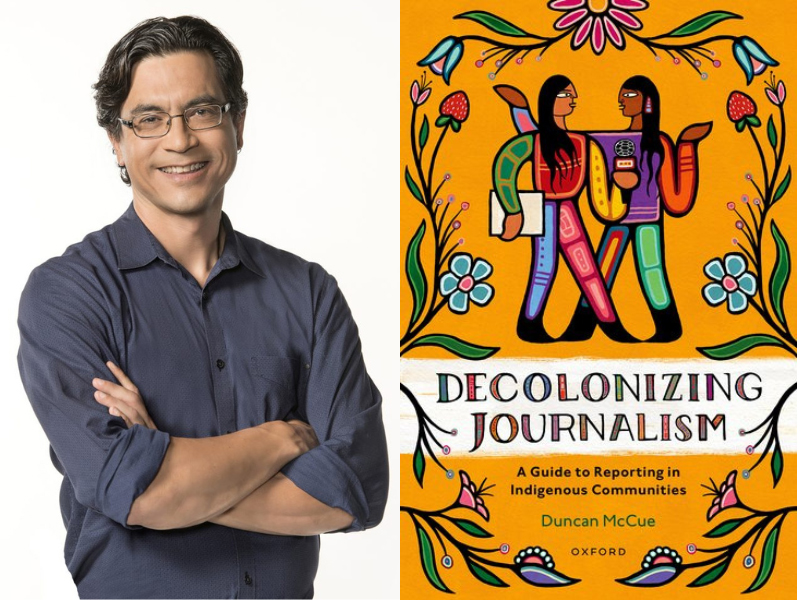A conversation with Duncan McCue on his new guide for journalists: Decolonizing Journalism

Award-winning journalist and TMU’s Roger’s Visiting Journalist, Duncan McCue, has crafted the country’s first textbook to guide journalists on reporting on Indigenous communities.
In Decolonizing Journalism (external link) , McCue provides best practices on how journalists can engage with Indigenous communities and respectfully share their stories.
We sat down with McCue to look deeper into his newest book and how it came about.
The CBC: where it all started
Around 2007, McCue took part in many meetings at the CBC alongside the senior producers, managers and the small number of Indigenous staff at the time.
"It was one of these many meetings that I've attended at the CBC to try to figure out how to get more indigenous content on the airwaves and have more indigenous voices. The newsrooms recognized back then, and this was 15 years ago, that it was a problem that there wasn't enough indigenous content. And the content that we were doing was unsatisfactory," says McCue.
In this meeting, the purpose was to solve those problems McCue brought up regarding the need for Indigenous content. However, he says that what became apparent to him was how uncomfortable non-Indigenous journalists felt in telling Indigenous stories.
"They just didn't feel prepared to tackle the topic. And so they were resisting doing the stories, or our assignment editors were reluctant to assign the stories because the product would be unsatisfactory," says McCue.
McCue's solution was to have a guide for non-Indigenous journalists to give them tips on tackling stories assigned in newsrooms.
"So I put together an online guide when I was on a fellowship at Stanford, which I published as a website (external link) (in 2011) intended for working journalists. I was imagining a journalist who didn't have a lot of time on their hands but wanted to figure out how to do a better job because most of the journalists I know want to make their stories better," says McCue. The website gained traffic from journalism instructors and students, too.
He realized the website content needed an update, so he proposed to Oxford Press to turn it into a textbook.
When developing the content for the website, McCue says he drew on some sources from Australian academics studying how journalists cover Indigenous stories. He also used some academics in the United States who were looking at the methodology of journalists.
However, McCue also says that he drew most of the information for the website based on his own reporting experience in Indigenous communities.
With the textbook, McCue says he went beyond his knowledge and included accounts from nine other Indigenous journalists and their reporting.
"I think that, to me, is one of the real special parts of this book, is that you get into the behind-the-scenes process for these nine Indigenous journalists and see how they work and understand that they also have dealt with some of the challenges of this historical trust gap between journalism, and Indigenous communities," says McCue.
A practical guide, not a history lesson
McCue says that the guide was not written to give a history lesson but to be practical about the day-to-day challenges journalists face when reporting on Indigenous communities.
"The goal of the guide was to try to be really practical about the day-to-day challenges that journalists find themselves in when they're reaching out to Indigenous communities to do news stories, and also to try to explain some of the cultural protocols to help journalists have kind of a baseline of cultural competency when it comes to dealing with indigenous people," says McCue.
The book has several chapters and sections with interviews, discussion questions and practical advice.
According to McCue, the simple lesson is in the last chapter, with one takeaway telling reporters what Indigenous people want: to be treated with respect.
"There's a long history of outsiders taking things away from Indigenous people, whether it's their artwork, or their bones, or their children or their land, and reporters are just the latest coming and taking things away, that being their stories. And so we have to understand that we're not going to be perceived as story takers, then we need to start acting with respect, and start giving back to these communities when we ask them to share their stories," says McCue.
McCue says he’s already thinking he wants to update his guide in the next edition by including more Inuit and Metis content. He says he’s also been approached about writing an edition for the United States.